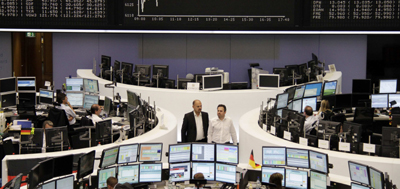Friday, 13 March 2015 00:46
 LONDON: The euro edged closer to parity with the dollar Thursday, in a boost to eurozone exporters battling deflation risks at home.
LONDON: The euro edged closer to parity with the dollar Thursday, in a boost to eurozone exporters battling deflation risks at home.
The euro dropped to $ 1.0495 — the lowest level for more than 12 years. It later stood at $ 1.0618, up from $ 1.0548 late on Wednesday in New York.
On stock markets in afternoon European trade, Frankfurt’s DAX 30 index dipped 0.07 percent to 11,797.18 points a day after surpassing 11,800 for the first time.
The CAC 40 in Paris eased 0.02 percent to 4,996.51 points, while London’s FTSE 100 index of leading companies jumped 1.0 percent to 6,789.62 compared with Wednesday’s close.
“The London market is outperforming its European counterparts as easing rumours out of China have made mineral stocks move higher, following heavy losses in recent sessions,” said David Madden, market analyst at IG trading group.
“Beijing is looking to relax its lending policies to stimulate economic activity and this has given a second wind to the battered mining sector.”
The euro, which has shed about 13 percent of its value this year, has meanwhile been losing further ground in recent days as the ECB has embarked on a policy of so-called quantitative easing.
The QE stimulus plan will see it buy 1.14 trillion euros worth of bonds over the next 18 months. The aim is to pump liquidity into the system so as to ward off deflation and spur growth in the single currency area.
“A clear pattern has emerged in the financial markets concerning stock indices and the euro-dollar currency pair,” said Fawad Razaqzada, technical analyst at Forex.com trading group.
“The major euro-based stock indices, such as Germany’s DAX, have rallied… as a weaker euro means more profits for German exporters.”
But QE has its critics, particularly in Germany, who argue that it reduces the pressure on eurozone governments to get their finances and economies in order.
“The combination of Greece’s renewed problems and the onset of deflation is a very toxic one for the eurozone,” Jonathan Loynes, analyst at Capital Economics research group, said in a note to clients.
“At best, it is likely to keep economic growth in the region fairly subdued. At worst, it could fully re-ignite the crisis and blow the currency union apart.”
Officials from Greece’s creditors returned to Athens Thursday for their first time since the Syriza party came to power, with the radical new government denying it had allowed back the hated “troika” it had vowed to shun.
Athens — which has been scrabbling for cash to meet its next major debt repayments — insisted it had not been strong-armed into submission.
The ECB has meanwhile bought 9.8 billion euros ($ 10.4 billion) in eurozone bonds in the first three days of its programme to ward off deflation and stimulate growth, a senior official said Thursday.
Standing apart from the rest was Ireland, whose economy powered ahead at the fastest rate in the European Union last year, as the eurozone nation staged a strong recovery after exiting its bailout programme, data showed Thursday.
Irish gross domestic product soared 4.8 percent in 2014, after the nation emerged from an international bailout in late 2013, the Central Statistics Office (CSO) said in a statement.
That was far higher than the EU average of 1.3 percent and the eurozone average of just 0.9 percent.
Copyright AFP (Agence France-Presse), 2015




























